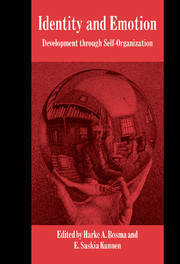Book contents
- Frontmatter
- Contents
- List of contributors
- Preface
- 1 Introduction
- 2 Developments in self-concept theory and research: affect, context, and variability
- Commentary: the self-concept is dead, long live … which construct or process? Differentiation and organization of self-related theories
- 3 The self and emotions
- Commentary: the self and emotions
- 4 Fish, foxes, and talking in the classroom: introducing dynamic systems concepts and approaches
- Commentary: fish, foxes, identity, and emotion
- 5 A relational perspective on the development of self and emotion
- Commentary: the personal experience of coherence
- 6 Affective processes in a multivoiced self
- Commentary: affective processes in a multivoiced self in action
- 7 Old–new answers and new-old questions for personality and emotion: a matter of complexity
- Commentary: emotions as sources of information about the self
- 8 Cognitive–emotional self-organization in personality development and personal identity
- Commentary: two faces of identity
- 9 A self-organizational approach to identity and emotions: an overview and implications
- References
- Author index
- Subject index
- Titles in the series
5 - A relational perspective on the development of self and emotion
Published online by Cambridge University Press: 28 October 2009
- Frontmatter
- Contents
- List of contributors
- Preface
- 1 Introduction
- 2 Developments in self-concept theory and research: affect, context, and variability
- Commentary: the self-concept is dead, long live … which construct or process? Differentiation and organization of self-related theories
- 3 The self and emotions
- Commentary: the self and emotions
- 4 Fish, foxes, and talking in the classroom: introducing dynamic systems concepts and approaches
- Commentary: fish, foxes, identity, and emotion
- 5 A relational perspective on the development of self and emotion
- Commentary: the personal experience of coherence
- 6 Affective processes in a multivoiced self
- Commentary: affective processes in a multivoiced self in action
- 7 Old–new answers and new-old questions for personality and emotion: a matter of complexity
- Commentary: emotions as sources of information about the self
- 8 Cognitive–emotional self-organization in personality development and personal identity
- Commentary: two faces of identity
- 9 A self-organizational approach to identity and emotions: an overview and implications
- References
- Author index
- Subject index
- Titles in the series
Summary
Begin with two premises.
First, psychological experience always implies a connection, a relationship: with another person, with cultural tools or language, or with the natural environment. Life is a network of relationships.
Second, psychological experience is always dynamic and changing. The simplest visual perception requires a change, either in a movement of the object or a movement of the eyes, head, or body. Thoughts and feelings fluctuate in a continuous pattern of change. These patterns of change themselves change as people develop. Life is a series of changes.
On the other hand, part of psychological experience is a sense of one's uniqueness (the self) and a sense of one's permanence through time (identity). How can this occur? How can people have a sense of themselves and their stability over time if psychological experience is fundamentally relational and dynamic?
The answer proposed in this chapter is that people experience the changes in their relationships according to different types of emotion and that emotions provide information about the self. Consistent with the two premises, emotions are conceptualized as dynamic experiences of harm or benefit, perceived as personally meaningful with respect to the individual's changing relationship with the environment (Barrett, 1993; Barrett and Campos, 1987; Fischer, Shaver, and Carnochan, 1990; Frijda, 1986; Lazarus, 1991b). According to Frijda, emotional experience “is glued, as it were, to its object, coinciding entirely with apprehending that object's nature and significance … [negative] emotional experience is perception of horrible objects, insupportable people, oppressive events” (Frijda, 1986: 188).
- Type
- Chapter
- Information
- Identity and EmotionDevelopment through Self-Organization, pp. 93 - 114Publisher: Cambridge University PressPrint publication year: 2001
- 18
- Cited by



